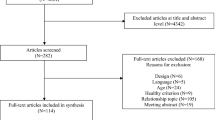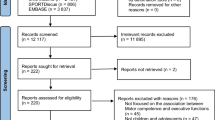Abstract
Cognitive training can improve working memory in children at risk of working memory difficulties; however, response to training can vary and doubt exists if working memory improvements can be sustained long- term. This study aimed to explore whether child motivation and family environment are associated with working memory trajectories in children born extremely preterm or extremely low birth weight. Forty-five 7-year-old children completed Cogmed Working Memory Training® at home over 5–7 weeks. Children and their families completed working memory tests and child motivation and family environment questionnaires at baseline, with working memory further tested 2 weeks, 12 months and 24 months post-training. Latent growth modelling was used to explore whether child motivation and family environment factors were associated with working memory trajectories. Children’s desire for challenge, training competence, and being from a single-parent household were associated with short-term improvements in verbal short-term memory. Children from poorer functioning families were associated with short-term improvements in working memory. There was little evidence that child motivation or family environment was associated with long-term working memory changes. Child motivation and the training environment may be important for understanding training effects in children born extremely preterm or extremely low birth weight, and warrant closer examination in working memory training studies.

Similar content being viewed by others
Abbreviations
- STM:
-
Short-term memory
- WM:
-
Working memory
- EP:
-
Extremely preterm
- ELBW:
-
Extremely low birth weight
- LGM:
-
Latent growth model
References
Alloway, T. P. (2007). Automated working memory assessment. London: Pearson Assessment.
Anderson, P., Lee, K. J., Roberts, G., Spencer-Smith, M., Thompson, D. K., Seal, M. L., Nosarti, C., Grehan, A., Josev, E. K., Gathercole, S. E., Doyle, L. W., & Pascoe, L. (2018). Long-term academic functioning following Cogmed working memory training for children born extremely preterm: a randomized controlled trial. Journal of Pediatrics, 202, 92–97.
Chacko, A., Feirsen, N., Bedard, A. C., Marks, D., Uderman, J. Z., & Chimiklis, A. (2013). Cogmed Working Memory Training for youth with ADHD: a closer examination of efficacy utilizing evidence-based criteria. Journal of Clinical Child & Adolescent Psychology, 42(6), 769–783.
Chacko, A., Bedard, A. C., Marks, D. J., Feirsen, N., Uderman, J. Z., Chimiklis, A., Rajwan, E., Cornwell, M., Anderson, L., Zwilling, A., & Ramon, M. (2014). A randomized clinical trial of Cogmed Working Memory Training in school-age children with ADHD: a replication in a diverse sample using a control condition. Journal of Child Psychology and Psychiatry, 55(3), 247–255.
Deci, E. L., & Ryan, R. M. (1985). Intrinsic motivation and self-determination in human behaviour. New York: Plenum.
Elliott, C. D. (2007). Differential Ability Scales (2nd ed.). San Antonio, TX: Harcourt Assessment.
Enders, C. K., & Bandalos, D. L. (2001). The relative performance of full information maximum likelihood estimation for missing data in structural equation models. Structural Equation Modeling: A Multidisciplinary Journal, 8(3), 430–457.
Epstein, N. B., Baldwin, L. M., & Bishop, D. S. (1983). The McMaster family assessment device. Journal of Marital and Family Therapy, 9(2), 171–180.
Gathercole, S. E., & Pickering, S. J. (2000). Assessment of working memory in six- and seven-year-old children. Journal of Educational Psychology, 92(2), 377–390.
Gathercole, S. E., Pickering, S. J., Ambridge, B., & Wearing, H. (2004). The structure of working memory from 4 to 15 years of age. Developmental Psychology, 40(2), 177.
Gottfried, A. E. (1990). Academic intrinsic motivation in young elementary school children. Journal of Educational Psychology, 82(3), 525–538.
Grimm, K. J., Ram, N., & Hamagami, F. (2011). Nonlinear growth curves in developmental research. Child Development, 82(5), 1357–1371.
Guye, S., De Simoni, C., & von Bastian, C. C. (2017). Do individual differences predict change in cognitive training performance? A latent growth curve modeling approach. Journal of Cognitive Enhancement, 1(4), 374–393.
Hu, L. t., & Bentler, P. M. (1999). Cutoff criteria for fit indexes in covariance structure analysis: conventional criteria versus new alternatives. Structural Equation Modeling: A Multidisciplinary Journal, 6(1), 1–55.
Hutchinson, E. A., De Luca, C. R., Doyle, L. W., Roberts, G., Anderson, P. J., & Group, f. t. V. I. C. S. (2013). School-age outcomes of extremely preterm or extremely low birth weight children. Pediatrics, 131(4), e1053–e1061.
Jaeggi, S. M., Buschkuehl, M., Jonides, J., & Shah, P. (2011). Short- and long-term benefits of cognitive training. Proceedings of the National Academy of Sciences, 108(25), 10081–10086.
Jaeggi, S. M., Buschkuehl, M., Shah, P., & Jonides, J. (2014). The role of individual differences in cognitive training and transfer. Memory & Cognition, 42(3), 464–480.
Kline, R. B. (2016). Principles and practice of structural equation modeling (4th ed.). New York: Guilford Press.
Lee, K., Ning, F., & Goh, H. C. (2013). Interaction between cognitive and non-cognitive factors: the influences of academic goal orientation and working memory on mathematical performance. Educational Psychology: An International Journal of Experimental Educational Psychology, 34(1), 73–91.
Lepper, M. R., Corpus, J. H., & Iyengar, S. S. (2005). Intrinsic and extrinsic motivational orientations in the classroom: age differences and academic correlates. Journal of Educational Psychology, 97(2), 184–196.
Lohaugen, G. C., Antonsen, I., Haberg, A., Gramstad, A., Vik, T., Brubakk, A. M., & Skranes, J. (2011). Computerized working memory training improves function in adolescents born at extremely low birth weight. Journal of Pediatrics, 158(4), 555–561 e554.
Melby-Lervag, M., & Hulme, C. (2013). Is working memory training effective? A meta-analytic review. Developmental Psychology, 49(2), 270–291.
Miller, I. W., Ryan, C. E., Keitner, G. I., Bishop, D. S., & Epstein, N. B. (2000). The McMaster approach to families: theory, assessment, treatment and research. Journal of Family Therapy, 22(2), 168–189.
Muthén, L. K., & Muthén, B. O. (1998-2012). Mplus User’s Guide. Los Angeles, CA: Muthén & Muthén.
Nelwan, M., Vissers, C., & Kroesbergen, E. H. (2018). Coaching positively influences the effects of working memory training on visual working memory as well as mathematical ability. Neuropsychologia, 113, 140–149.
Pascoe, L., Roberts, G., Doyle, L. W., Lee, K. J., Thompson, D. K., Seal, M. L., Josev, E. K., Nosarti, C., Gathercole, S., & Anderson, P. J. (2013). Preventing academic difficulties in preterm children: a randomised controlled trial of an adaptive working memory training intervention - IMPRINT study. BMC Pediatrics, 13, 144.
Pascoe, L., Spencer-Smith, M., Giallo, R., Seal, M. L., Georgiou-Karistianis, N., Nosarti, C., Josev, E. K., Roberts, G., Doyle, L. W., Thompson, D. K., & Anderson, P. J. (2018). Intrinsic motivation and academic performance in school-age children born extremely preterm: the contribution of working memory. Learning and Individual Differences, 64, 22–32.
Peijnenborgh, J. C. A. W., Hurks, P. M., Aldenkamp, A. P., Vles, J. S. H., & Hendriksen, J. G. M. (2016). Efficacy of working memory training in children and adolescents with learning disabilities: a review study and meta-analysis. Neuropsychological Rehabilitation, 26(5–6), 645–672.
Pickering, S. J., & Gathercole, S. E. (2001). Working memory test battery for children - manual. London: The Psychological Corporation.
Roberts, G., Howard, K., Spittle, A. J., Brown, N. C., Anderson, P. J., & Doyle, L. W. (2008). Rates of early intervention services in very preterm children with developmental disabilities at age 2 years. Journal of Paediatrics and Child Health, 44(5), 276–280.
Roberts, G., Quach, J., Mensah, F., Gathercole, S., Gold, L., Anderson, P., Spencer-Smith, M., & Wake, M. (2015). Schooling duration rather than chronological age predicts working memory between 6 and 7 years: Memory Maestros Study. Journal of Developmental & Behavioral Pediatrics, 36(2), 68–74.
Roberts, G., Quach, J., Spencer-Smith, M., Anderson, P. J., Gathercole, S., Gold, L., Sia, K. L., Mensah, F., Rickards, F., Ainley, J., & Wake, M. (2016). Academic outcomes 2 years after working memory training for children with low working memory: a randomized clinical trial. JAMA Pediatrics, 170(5), e154568.
Ryan, R., Mims, V., & Koestner, R. (1983). Relation of reward contingency and interpersonal context to intrinsic motivation: a review and test using cognitive evaluation theory. Journal of Personality and Social Psychology, 45(4), 736–750.
Sala, G., & Gobet, F. (2017). Working memory training in typically developing children: a meta-analysis of the available evidence. Developmental Psychology, 53(4), 671–685.
Sarsour, K., Sheridan, M., Jutte, D., Nuru-Jeter, A., Hinshaw, S., & Boyce, W. T. (2011). Family socioeconomic status and child executive functions: the roles of language, home environment, and single parenthood. Journal of the International Neuropsychological Society, 17(1), 120–132.
Simons, D. J., Boot, W. R., Charness, N., Gathercole, S. E., Chabris, C. F., Hambrick, D. Z., & Stine-Morrow, E. A. L. (2016). Do “brain-training” programs work? Psychological Science in the Public Interest, 17(3), 103–186.
Soderqvist, S., Nutley, S. B., Ottersen, J., Grill, K. M., & Klingberg, T. (2012). Computerized training of non-verbal reasoning and working memory in children with intellectual disability. Frontiers in Human Neuroscience, 6, 271.
Soderqvist, S., Matsson, H., Peyrard-Janvid, M., Kere, J., & Klingberg, T. (2014). Polymorphisms in the dopamine receptor 2 gene region influence improvements during working memory training in children and adolescents. Journal of Cognitive Neuroscience, 26(1), 54–62.
Spittle, A. J., Treyvaud, K., Lee, K. J., Anderson, P. J., & Doyle, L. W. (2018). The role of social risk in an early preventative care programme for infants born very preterm: a randomized controlled trial. Developmental Medicine & Child Neurology, 60(1), 54–62.
Studer-Luethi, B., Bauer, C., & Perrig, W. J. (2016). Working memory training in children: effectiveness depends on temperament. Memory & Cognition, 44(2), 171–186.
Taylor, G., Jungert, T., Mageau, G. A., Schattke, K., Dedic, H., Rosenfield, S., & Koestner, R. (2014). A self-determination theory approach to predicting school achievement over time: the unique role of intrinsic motivation. Contemporary Educational Psychology, 39(4), 342–358.
Titz, C., & Karbach, J. (2014). Working memory and executive functions: effects of training on academic achievement. Psychological Research, 78(6), 852–868.
von Bastian, C. C., & Oberauer, K. (2014). Effects and mechanisms of working memory training: a review. Psychological Research, 78(6), 803–820.
Wilson-Ching, M., Pascoe, L., Doyle, L. W., & Anderson, P. J. (2014). Effects of correcting for prematurity on cognitive test scores in childhood. Journal of Paediatrics and Child Health, 50(3), 182–188.
Funding
This research was supported by the National Health and Medical Research Council (NHMRC: Project Grant 1028422, Centre of Research Excellence in Newborn Medicine (1060733), Program Grant 606789, Senior Research Fellowship 1081288, Career Development Fellowship 1085754), Monash University and the Murdoch Children’s Research Institute. The Murdoch Children’s Research Institute is supported by the Royal Children’s Hospital, The Royal Children’s Hospital Foundation, Department of Paediatrics, The University of Melbourne and the Victorian Government’s Operational Infrastructure Support Program.
Author information
Authors and Affiliations
Corresponding author
Ethics declarations
The study was approved by the Royal Children’s Hospital Human Research Ethics Committee in Melbourne, Australia. Written informed consent was obtained from primary caregivers before participation.
Conflict of Interest
The authors declare that they have no conflicts of interest.
Additional information
Publisher’s Note
Springer Nature remains neutral with regard to jurisdictional claims in published maps and institutional affiliations.
Electronic Supplementary Material
ESM 1
(DOCX 91 kb)
Rights and permissions
About this article
Cite this article
Pascoe, L., Spencer-Smith, M., Wiley, J. et al. Child Motivation and Family Environment Influence Outcomes of Working Memory Training in Extremely Preterm Children. J Cogn Enhanc 3, 396–404 (2019). https://doi.org/10.1007/s41465-019-00138-3
Received:
Accepted:
Published:
Issue Date:
DOI: https://doi.org/10.1007/s41465-019-00138-3




